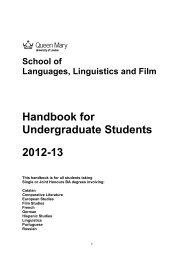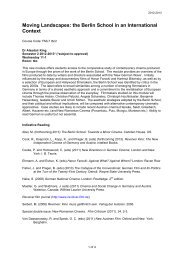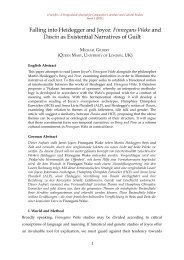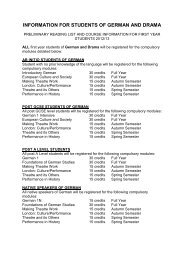Create successful ePaper yourself
Turn your PDF publications into a flip-book with our unique Google optimized e-Paper software.
eTransfers. A Postgraduate eJournal for Comparative Literature and Cultural Studies<br />
Issue 1 (2011)<br />
Indeed, scientific experiments isolate and reproduce in a standardised way one very<br />
special aspect of a naturally occurring phenomenon, thus splitting up the natural<br />
context into many isolated aspects that are difficult to recombine later on.<br />
This fragmentation of contemporary science pertains particularly to cognitive sci-<br />
ence, an enterprise that is fundamentally interdisciplinary — and that has been so<br />
ever since its beginnings in the 1950s — incorporating research from neurology, psy-<br />
chology, linguistics and Artificial Intelligence research, but also from cultural studies<br />
and philosophy to name just the most important disciplinary groups. 7 Even though<br />
cognitive research from these disciplines can be readily subsumed under the label<br />
“cognitive science”, the knowledges of cognition — the plural is used here deliber-<br />
ately — that are thus produced remain very much bound to their disciplinary ori-<br />
gins. One reason for the especially deep fragmentation of cognitive science is its posi-<br />
tion astride what C.P. Snow has called the ‘Two Cultures’. 8 After all, the disciplines<br />
contributing to cognitive science stem from the sciences and the humanities alike.<br />
Consequently, cognitive science cannot be regarded as a ‘hard’ science in the same<br />
way as, for instance, physics.<br />
The object of cognitive science is to understand cognition. Seen from a functional-<br />
ist perspective, cognition intervenes between sense perception and motor action. 9<br />
This means that in human beings a sensory stimulus, such as the perception of hun-<br />
ger, is not automatically coupled with a certain response. Instead, human beings are<br />
able to choose between different responses, such as getting food immediately or post-<br />
poning the satisfaction of one’s needs. Many different processes are necessary for<br />
such a complex phenomenon to exist. Thus, in accordance with Margaret Boden’s<br />
monumental history of cognitive science, cognition will be understood in this paper<br />
as covering “all aspects of mind and behaviour”. 10 In this view, cognition includes<br />
7 Cf. the introductory sections to Robert A. Wilson and Frank C. Keil (eds.), The MIT Encyclopedia of<br />
the Cognitive Sciences (Cambridge, Mass. and London: The MIT Press, 1999).<br />
8 Charles Percy Snow, The Two Cultures (Cambridge: Cambridge University Press, 1998 [1959]).<br />
9 Gerhard Strube, “Kognitionswissenschaft/cognitive science,” in Wörterbuch der<br />
Kognitionswissenschaft, ed. Gerhard Strube et al. (Stuttgart: Klett-Cotta, 1996) [CD-ROM].<br />
10 Margaret A. Boden, Mind as Machine. A History of Cognitive Science. Vol. 1 (Oxford: Clarendon Press,<br />
2006), 9.<br />
6







